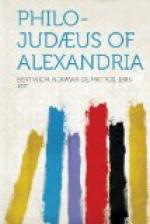* * * * *
III
PHILO’S WORKS AND METHOD
The first thing that strikes a reader of Philo is the great volume of his work: he is the first Jewish writer to produce a large and systematic body of writings, the first to develop anything in the nature of a complete Jewish philosophy. He had essentially the literary gift, the capacity of giving lasting expression to his own thought and the thought of his generation. Treating him merely as a man of letters, he is one of the chief figures in Greek literature of the first century. We have extant over forty books of his composition, and nearly as many again have disappeared. His works are one and all expositions of Judaism, but they fall into six distinct classes of exegesis:
I. The allegorical commentary, or “Allegories of the Laws,” which is a series of philosophical treatises based upon continuous texts in Genesis, from the first to the eighteenth chapter. Together with this, the best authorities place the two remaining books on the “Dreams of the Bible,” which are a portion of a larger work, and deal allegorically with the dreams of Jacob and Joseph.
II. The Midrashic commentary on the Five Books of Moses, for which we have no single name, but which was clearly intended to be an ethical and philosophical treatise upon the whole law.
III. A commentary in the form of “Questions and Answers to Genesis and Exodus,” which is incomplete now, and save for detached fragments exists only in a Latin translation. In its original form it provided a short running exegesis, verse by verse, to the whole of the first three books of the Pentateuch, and was contained in twelve parts.
IV. A popular and missionizing presentation of the Jewish system in the form of a “Life of Moses,” and three appended tractates on the virtues “Courage,” “Humanity,” and “Repentance.” Scholars[83] are of opinion that there are gaps in the extant “Life of Moses,” but the general plan of the work is clear. It is at once an abstract and an interpretation of Jewish law for the Greek world, and also an ideal biography of the Jewish lawgiver.
V. Philosophical monographs, not so intimately connected with the Bible as the preceding works; but in the nature of rhetorical exercises upon the stock subjects of the schools, which receive a Jewish coloring by reason of Biblical illustrations.
VI. Historical and apologetic works that set out the case of the contemporary Jews against their persecutors and traducers. Of these writings the larger part has disappeared, and of a portion of those which remain the genuineness has been doubted.
Lastly, there is a miscellaneous number of works ascribed to Philo, which all good scholars[84] now admit to be spurious: “On the Incorruptibility of the World,” “On the Universe,” “On Samson,” and “On Jonah,” etc.




